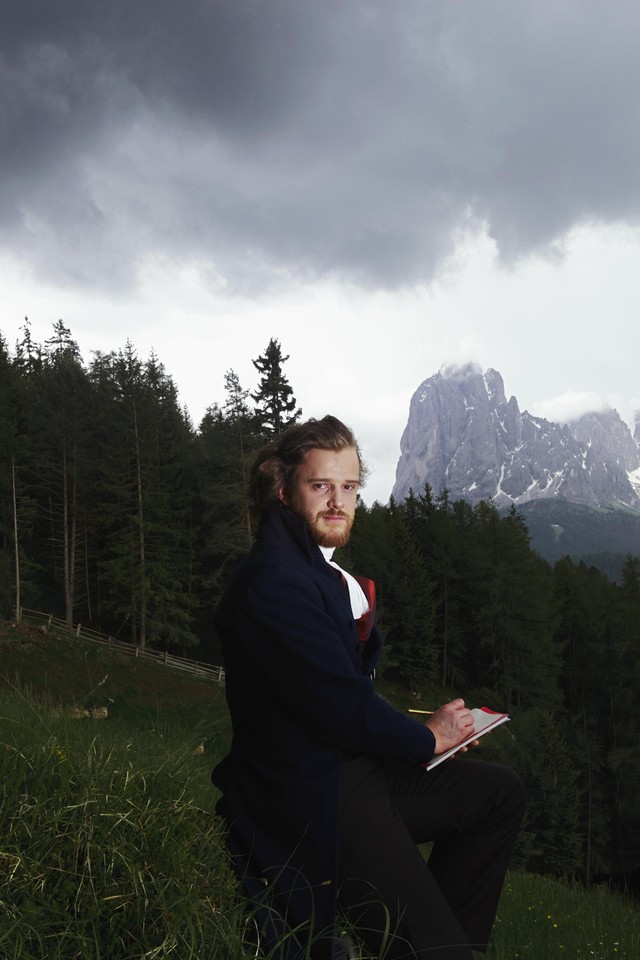Press Release
Scheduled to be inaugurated on June 23, 2018—the day of 268th anniversary of the birth of a Father of the Dolomites, Dieudonné Sylvain Guy Tancrède de Gratet de Dolomieu usually known as Déodat de Dolomieu, French geologist who in 1792 discovered a calcareous rock which would be named after him along with the grandiose mountain range of northeastern Italy—the 6th edition of the Biennale Gherdëina is a venture into the polymorphous nature of the mountains and their language.

Gherdëina Biennale
Ortesei, Val Gardena (Italy)
24.06 - 15.09.2018


© ArtCatalyse International / Marika Prévosto 2018. All Rights Reserved
Sissa Micheli, Déodat de Dolomieu, 2018. Model: Adam Demetz.

Conducted under a desire of Writing the Mountains, the exhibition combines liminal disciplines of cultural geology, communal ecology, performative science and relational practice of engaged aesthetics, challenging conventional forms of representation and perception as in a reference to the vocabulary of nature, landscape and a community. It is a polylogue; it foregrounds collaborative and participatory modes of working, mingling polyphonic forms, from performance, including dance and singing, poetry and spoken word, through architecture and design, staging and display, down to the ephemeral forms, focused on communal spirit, engagement, and collectivity, notwithstanding research and in situ fieldwork. As such, Writing the Mountains is a poetic proposition; here, in what may be considered an act of learning from the mountains, (the language of) poetry is a score for a collection of artistic utterances that celebrate the site and its sublime intensity. Poetic narrative Überwasser by Alessandro De Francesco, commissioned for the Biennale is a manifesto of an “intimate immensity” of the Dolomites: a series of sensual tableaux that along with a lexicon of the nature’s elemental language provide a prototype for Writing the Mountains multiple scenarios. From Gianni Pettena’s architectural intervention of Poiesis, echoing the anarchitect’s radical gestures of the late 1960s, through Nico Vascellari’s explorations of the alchemy and paganism, down to the lyrical fetishism of materials in the sculptural poetry of Alicja Kwade’s work, the exhibition zooms in and out the region’s dynamics of cultural, historical and linguistic nearness and distance. Sissa Micheli’s grandiose opera, Dolomieu, based upon the life and work of an adventurous scientist and performed on the balconies of Ortisei and Mathilde Rosier’s diorama, constructed within the backstage of Casa Ladina and restaging the artist’s procession We are those Fossils hidden in those Rocks. We are the Ocean hidden in Time appropriate the place as a vivid field of the Open, a performance of the region’s astounding natural history.
Thus as a sequel to the previous edition of the biennale which focused on the rhetoric of longing, Writing the Mountains searches for the patterns of belonging, identification and cohabitation. It pays an homage to the mountains and the community which inhabits them, reflecting the endurance and resilience, so typical for this site and its people, praising the mountains as a site of awe and intimacy, emancipation and resistance. The exhibition considers the biotope of the mountains as a ritual in flux, archetypal and ever changing, redrafted and transcribed, over and over anew, both mystical and real, simultaneously sublime and mundane, an articulation of a desire, woven of legends, myths and everyday dreams.
The Biennale Gherdëina was established as a collateral event to Manifesta 7, held in the Summer of 2008 in Trentino Alto Adige. Taking place for the 6th time, the location once again is Ortisei in Val Gardena. The Biennale Gherdëina is putting on display a range of contemporary artworks, most of which were specifically selected and created for the public space in the center of Ortisei. For the first time, the exhibition takes a further step by expanding beyond the town center and embracing the surrounding mountain landscape, featuring, amongst others, Pavilion for Poetry Diogenes’ Barell, commissioned by the biennale.
The artists : Mariana Castillo Deball, Claudia Comte, Alessandro De Francesco, Alicja Kwade, Sissa Micheli, Štefan Papčo, Giuseppe Penone, Simon Perathoner, Gianni Pettena, Agnieszka Polska, Jiří Příhoda, Gregor Prugger, Mathilde Rosier, Egill Sæbjörnsson, Fabien Vallos, Nico Vascellari, Franz West.
Curated by Adam Budak